Emission Monitoring System Market Outlook – 2031
The global emission monitoring system market was valued at $3.8 billion in 2021 and is projected to reach $8.7 billion by 2031, growing at a CAGR of 8.8% from 2022 to 2031.
Emission monitoring is the process of assessing the environmental impacts of hazardous emissions of harmful gasses to help various businesses reach their long-term sustainability goals. An emission monitoring system refers to a tool used for monitoring the emissions of various gasses including various gases in the air such as carbon dioxide, nitrogen, mercury, sulfur dioxide, carbon monoxide, hexavalent chromium, and others from industrial facilities. An emission monitoring system is mainly of two types namely, continuous emission monitoring system (CEMS) and predictive emission monitoring system (PEMS).
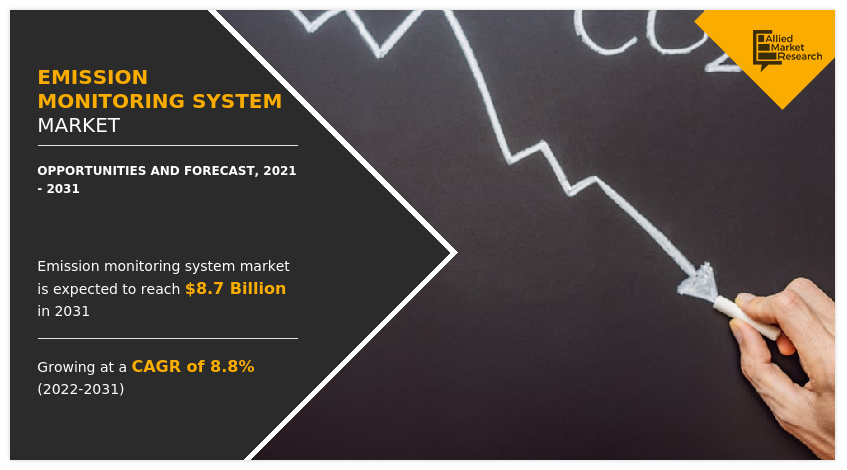
An emission monitoring system comprises several hardware components such as gas analyzers, filters, and others along with various software solutions to record and analyze the data generated. These systems are majorly employed in industrial plants and intensively used for several industrial purposes to regulate the emission let out from those industries. The stringent regulations imposed by the governments of several nations to restrict air pollution and ensure the well-being of the global environment have propelled the emission monitoring system market growth.
The rise in several coal-powered power plants and the surge in demand for energy generation drive the growth of the emission monitoring system industry. Moreover, stringent government regulations and standards imposed by several governments to minimize several health issues developed on the exposure to harmful emissions. As a result, the applications for efficient emission monitoring systems are crucial in industries.
Notable factors that positively affect the emission monitoring system market size include the rise in dependency of countries worldwide on coal-fired power plants to generate electricity, and stringent regulations imposed by the government and concerned authorities to monitor and control carbon emissions. However, Growing focus on clean energy expected to hinder the growth of the emission monitoring system market share. Moreover, emerging trends toward the development of coal-fired power generation plants in developing nations are expected to offer huge market opportunities in the coming years.
Key Takeaways
- The global emission monitoring system market study covers 20 countries. The research includes a segment analysis of each country in terms of value for the projected period.
- More than 1,500 product literature, industry releases, annual reports, and other such documents of major market industry participants along with authentic industry journals, trade associations' releases, and government websites have been reviewed for generating high-value industry insights.
- The study integrated high-quality data, professional opinions and analysis, and critical independent perspectives. The research approach is intended to provide a balanced view of global markets and to assist stakeholders in making educated decisions to achieve their most ambitious growth objectives.
Segment Overview
The emission monitoring system market is segmented into components, end-user, and system types.
By Component
The market is divided into hardware and services. The hardware segment was the highest revenue contributor to the market in 2021.
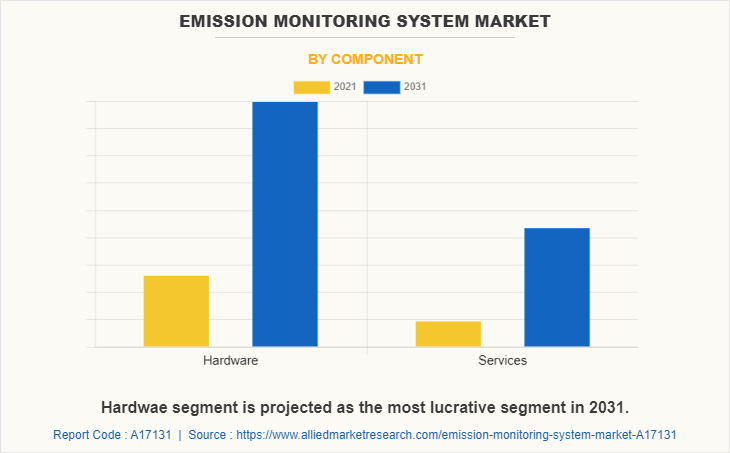
By End User
The end user segment is divided into industrial, energy & utilities, and others. The industrial segment was the highest revenue contributor to the market in 2021.
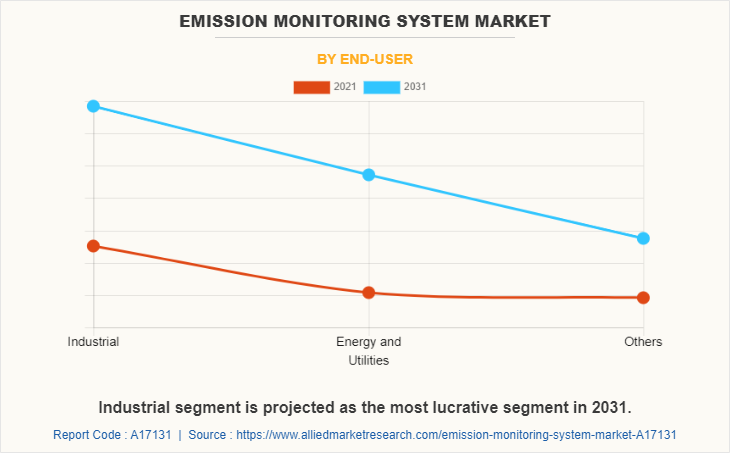
By System Type
The PEMS segment was the highest revenue contributor to the market in 2021 and is expected to follow the same trend till 2031.
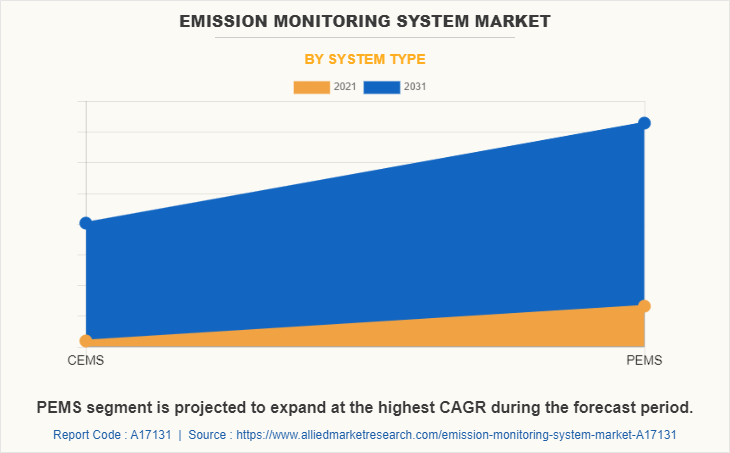
Regional/Country Market Outlook
North America: The U.S. leads the emission monitoring system market, driven by stringent regulatory requirements aimed at reducing air pollution and greenhouse gas emissions. The increasing emphasis on environmental compliance and sustainability among industries fosters demand for advanced monitoring technologies. Strong technological infrastructure and ongoing R&D investments further enhance market growth, as companies seek innovative solutions to meet regulatory standards.
Europe: Europe is at the forefront of emission monitoring, with countries like Germany and the UK implementing rigorous environmental policies and regulations. The European Union’s commitment to climate targets and sustainability drives the adoption of advanced monitoring systems across various sectors, including manufacturing and transportation. Other nations, such as France and the Netherlands, are also seeing growth, supported by government initiatives that encourage greener technologies.
Asia-Pacific: China is a major player in the emission monitoring system market, propelled by rapid industrialization and increasing regulatory pressure to address air quality issues. The government's focus on environmental protection and the expansion of renewable energy sources contribute to market demand. Additionally, countries like India are experiencing growth as they implement stricter emission standards and invest in monitoring technologies to combat pollution.
LAMEA: In Latin America, Brazil, and Mexico are witnessing increased demand for emission monitoring systems, driven by environmental regulations and the need for compliance in industrial sectors. In the Middle East, particularly the UAE and Saudi Arabia, significant investments in sustainability and smart city initiatives are promoting the adoption of these systems. In Africa, countries like South Africa are beginning to prioritize emission monitoring to address pollution and meet international standards, indicating a growing market potential in the region.
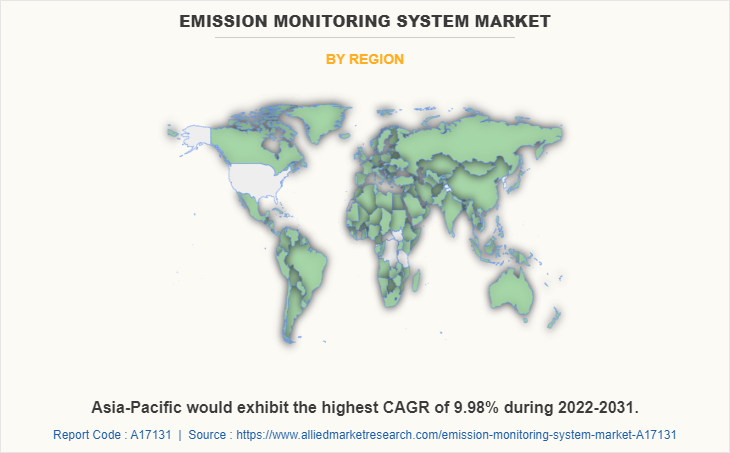
Key Market Dynamics
The emission monitoring system market is primarily driven by stringent regulatory frameworks aimed at reducing air pollution and mitigating climate change. Governments worldwide are implementing tighter emission standards and reporting requirements, prompting industries to invest in advanced monitoring technologies. The growing awareness of environmental issues among consumers and businesses alike further fuels demand, as organizations seek to enhance their sustainability credentials and comply with regulations. Additionally, technological advancements, such as the integration of IoT and AI, are improving the accuracy and efficiency of emission monitoring systems, making them more appealing to end users.
Opportunities within this market are abundant, particularly as industries transition towards cleaner energy sources and sustainable practices. The rise of renewable energy sectors, such as wind and solar, creates demand for monitoring solutions to ensure compliance with environmental regulations. Furthermore, emerging markets are beginning to adopt emission monitoring technologies, driven by rapid industrialization and increasing regulatory pressure. This presents a significant growth opportunity for manufacturers and service providers. While the market is promising, it faces some restraints, such as high initial costs and technical complexities associated with installing and maintaining monitoring systems, which may deter smaller enterprises from adopting these solutions. Addressing these challenges will be essential for maximizing market potential.
Competitive Analysis
The key players profiled in this report include ABB Ltd, Advanced Emissions Solutions Inc., AMETEK Inc., Babcock & Wilcox Company, Baker Hughes, Emerson Electric Company, Envea Envirp & Industrial Solutions ME, Fuji Electric France SAS, Horiba Ltd., Intertek Group plc., Parker Hannifin, Rockwell Automation Inc., Sick AG, Siemens AG, Teledyne Technologies Incorporated and Thermo Fisher Scientific Inc.. These key players have adopted strategies, such as product portfolio expansion, mergers & acquisitions, agreements, regional expansion, and collaborations to enhance their market penetration.
Report Coverage & Deliverables
This report delivers in-depth insights into the emission monitoring system market by component, end user, system type, region, and key strategies employed by major players. It offers detailed emission monitoring system market forecasts and emerging trends.
Component Insights
The emission monitoring system market is segmented into hardware and services, both crucial for growth. The hardware segment, including sensors and analyzers, is vital due to advancements in technology that enhance accuracy and reliability in emissions measurement, driven by stringent regulations and increasing environmental awareness. Meanwhile, the services segment, encompassing installation, maintenance, and consulting, is expanding as organizations seek expert guidance to comply with regulations and optimize monitoring systems. This dual focus on hardware and services ensures comprehensive solutions for effective emissions management.
End User Insights
The emission monitoring system market's end-user segment includes industrial, energy & utilities, and others, each driving growth in distinct ways. The industrial sector is expanding due to stringent regulations on emissions and the need for compliance, prompting investments in monitoring technologies. The energy and utilities segment is crucial as it faces increasing pressure to reduce carbon footprints and enhance sustainability practices. Additionally, the "others" category, encompassing sectors like transportation and agriculture, is growing as more industries recognize the importance of emissions management for environmental accountability and regulatory compliance.
System Type Insights
The emission monitoring system market is segmented into Continuous Emission Monitoring Systems (CEMS) and Predictive Emission Monitoring Systems (PEMS), each playing a vital role in emissions management. CEMS are essential for real-time, regulatory compliance as they provide continuous, accurate data on emissions, helping industries meet stringent government regulations. In contrast, PEMS offers predictive insights based on operational data, allowing facilities to optimize processes and anticipate emissions trends. The growing emphasis on sustainability and regulatory adherence drives demand for both systems, enhancing overall environmental accountability.
Regional Insights
The emission monitoring system market is witnessing significant growth in North America, primarily driven by stringent regulatory requirements and a strong emphasis on environmental sustainability. The U.S. leads this trend, as industries seek to comply with increasingly stringent emissions standards and enhance their environmental performance. Additionally, the European market is also robust, with countries like Germany and the UK implementing comprehensive regulations that promote emissions monitoring technologies. Meanwhile, the Asia-Pacific region, particularly China and India, is emerging as a lucrative market due to rapid industrialization and growing regulatory pressures.
Key Strategies and Developments
- April 2022 - ClassNK introduced the 'ClassNK ZETA (Zero Emission Transition Accelerator),' a greenhouse gas emissions management tool that enables users to accurately track CO2 emissions and assess and simulate their Carbon Intensity Indicator (CII) ratings.
- March 2022 - A Swedish start-up backed by Google, Normative, launched a free version of its carbon emissions tracker aimed at helping small businesses establish a baseline for their emissions. Normative's Business Carbon Calculator aids small and medium-sized enterprises in monitoring their carbon footprint and identifying emission hotspots using data such as facility size and expenditure on heating, electricity, and gas. Additionally, Normative offers paid products for larger businesses.
Key Benefits for Stakeholders
- This report provides a quantitative analysis of the market segments, current trends, estimations, and dynamics of the emission monitoring system market analysis from 2021 to 2031 to identify the prevailing emission monitoring system market opportunity.
- The market research is offered along with information related to key drivers, restraints, and opportunities.
- Porter's five forces analysis highlights the potency of buyers and suppliers to enable stakeholders to make profit-oriented business decisions and strengthen their supplier-buyer network.
- An in-depth analysis of the emission monitoring system market outlook assists in determining the prevailing market opportunities.
- Major countries in each region are mapped according to their revenue contribution to the global market.
- Market player positioning facilitates benchmarking and provides a clear understanding of the present position of the market players.
- The report includes an analysis of the regional as well as global emission monitoring system market trends, key players, market segments, application areas, emission monitoring system market forecast, and market growth strategies.
Emission Monitoring System Market Report Highlights
| Aspects | Details |
| By Component |
|
| By End-User |
|
| By System Type |
|
| By Region |
|
| Key Market Players | Fuji Electric France SAS, Horiba Ltd.,, Envirp & Industrial solutions ME, Envea, Rockwell Automation Inc., Intertek Group plc, Teledyne Technologies Incorporated, Emerson Electric Company, Advanced Emissions Solutions Inc., Sick AG, ABB Ltd, Parker Hannifin, Thermo Fisher Scientific Inc., Siemens AG, Baker Hughes, Babcock & Wilcox Company, AMETEK Inc. |
Analyst Review
According to insights of the CXOs of leading companies, the emission monitoring system market is expected to leverage high potential for industrial and energy & utilities industry verticals. The current business scenario has witnessed an increase in demand for emission monitoring systems, particularly in developing regions, owing to rise in government mandates related to pollution control and improvement of air quality. Companies in this industry have adopted various innovative techniques such as mergers and acquisitions to strengthen their business position in the competitive matrix.
The emission monitoring system market has steadily gained traction, owing to rise in demand for enhanced technologies in emission monitoring services such as integration of IoT, AI, and rise in adoption of automated measuring systems and others.
Moreover, surge in industrialization, coupled with the growth in utilization of emission analytics solutions in order to monitor emissions from the manufacturing sector are some of the additional factors anticipated to drive the market growth during the forecast period.
The key players profiled in the report include emission monitoring system market players, such as ABB Ltd, Advanced Emissions Solutions Inc., AMETEK Inc., Babcock & Wilcox Company, Baker Hughes, Emerson Electric Company, Envea Envirp & Industrial solutions ME, Fuji Electric France SAS, Horiba Ltd., Intertek Group plc, Parker Hannifin, Rockwell Automation Inc., Sick AG, Siemens AG, Teledyne Technologies Incorporated and Thermo Fisher Scientific Inc.
Emission Monitoring System Market is expected to grow at 8.8 % CAGR from 2021 - 2031?
The market value of Emission Monitoring System Market by the end of 2031 is anticipated to be $ 8.65 billion.
The major players in the Emission Monitoring System Market are as ABB Ltd, Advanced Emissions Solutions Inc., AMETEK Inc., Babcock & Wilcox Company, Baker Hughes, Emerson Electric Company, Envea Envirp & Industrial solutions ME and others.
The emission monitoring system market is broadly segmented on the basis of component, end user, system type and region.
The largest regional market for Emission Monitoring System Market is the North America region.
Loading Table Of Content...



